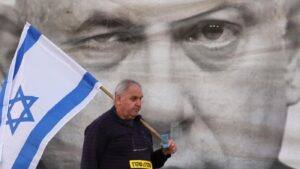In his election campaign, far-right Israeli politician Itamar Ben Gvir, leader of the Jewish Power party, asked a question to which the then Israeli political establishment had no answer: “Who is in charge?”
It was a taunt which tapped into the deep well of feeling that the Jews had lost control over the Palestinians living in their state. But within weeks of Benjamin Netanyahu’s latest reincarnation as head of the most extreme government in Israel’s history, millions of Israelis are now asking themselves a similar question: who have we got in charge?
A justice minister who plans to neutralise judicial authority and independence? A finance minister who questions the right of Russian immigrants to be considered Jewish? A national security minister whose first act was to storm Al-Aqsa Mosque?
The battle in Israel is framed as a fight for democracy against fascists. It does not, at least yet, morph into a debate about the daily cruelty and human cost of sustaining the Zionist project
In truth, the mass demonstrations are only concerned with the first of the three issues, although the issue of Russian identity is explosive enough – Bezalel Smotrich called it a Jewish time bomb.
The Palestinians were once again excluded by the liberal Zionist revolt. After a few Palestinian flags appeared amongst the sea of blue and white ones in the first mass protests, the organisers rushed to renounce a Palestinian presence. Nonetheless, liberal Zionists got a taste of what it was like to be Palestinian at the hands of the new elite – the settler religious nationalist movement.
True, the battle is framed as a fight for democracy against fascists. It does not, at least yet, morph into a debate about the daily cruelty and human cost of sustaining the Zionist project itself. But those questions do not lie far below the surface.
Read this commentary published by Yedioth Ahranoth, a centrist newspaper which has been loyal to official Israeli line about the occupation. “The inconvenient truth is that there can be no democracy along with an occupation; there can be no democracy in a country whose economic policy allows the strong to leap forward while the weak get left behind; and there can be no democracy in a place where Arabs are kept off stage.”
Anyone who fails to address those issues clearly and coherently will also fail in their thoroughly justified effort to stop one part of the process The inconvenient truth is that anyone who wants to get a million people into the streets to shake the country in response to Levin’s plan can’t stammer platitudes about “shrinking the conflict” and about being “neither right nor left”.


